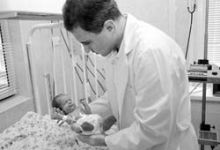Every year an estimated 7.9 million children, six percent of all births worldwide, are born with various medical pathologies caused by genetic factors. Hundreds of thousands more acquire similar defects as a result of maternal diseases or harmful habits of both parents. The most widespread pathologies in newborns are disorders of the central nervous system and the locomotor system, heart defects, blood diseases, neurological disorders, and Down syndrome. Every year 3.3 million children die before the age of five as a result of such defects, while 3.2 million of those who survive may be disabled for life. According to recently publicized data of the humanitarian aid organization March of Dimes, Ukraine records 54.5 cases of serious pathology per 1,000 births.
Although all countries face similar problems, practice has shown that less developed countries account for 94 percent of such cases. The incidence of infant pathologies is lowest in Switzerland and France. This is due to a highly developed system of diagnostics in high-income countries, which makes it possible to diagnose the pathology during the early stages of pregnancy, as well as skilled doctors with cutting-edge equipment that allows them to operate even on newborns. The experience of such high-income countries shows that the incidence of mortality and disability from birth defects can be reduced by up to 70 percent in other countries.
One of the key medical problems in Ukraine is helping children with congenital heart defects. “Every year over 5,000 children with congenital heart defects are born in Ukraine,” says Dr. Nadia Rudenko, deputy director of the Scientific and Practical Medical Center of Child Cardiology and Cardiac Surgery of Ukraine’s Ministry of Health. “In the entire post-Soviet space only Ukraine and Russia have centers of pediatric cardiac surgery, which can compete with similar clinics in the world’s leading countries. In Ukraine these kinds of institutions emerged in the early 1990s, when the incidence of congenital heart defects in children was 5.5 cases per 1,000 births in Kyiv alone.”
According to Dr. Rudenko, many factors can cause congenital heart defects in children. They include harmful parental habits (smoking, alcohol and drug abuse), environmental factors, harmful working conditions, and viral diseases affecting the expectant mother during the first months of pregnancy. Although science has yet to determine the degree to which the Chornobyl disaster has influenced the incidence of such diseases, since 1986 such cases have become more common. Experts, however, tend to attribute this fact to improvements in diagnostics.
Experts also consider chronic parental illness one of the factors behind congenital heart defects in children. “If the mother, father, or close relatives have a heart defect, the likelihood of its occurrence in the unborn child is very high,” says Dr. Iryna Lukyanova, who heads the Department of Functional Diagnostics and Prenatal Cardiology at the Institute of Pediatrics, Obstetrics, and Gynecology of the Ukrainian Academy of Medical Sciences. “The same goes for cardiovascular and endocrine diseases (sugar diabetes, disorders of the thyroid gland) in the parents. Unfortunately, it is impossible to prevent the child from developing the disease. Women with similar risk factors must plan their pregnancy and necessarily undergo a course of treatment before conceiving a child. Doing this during pregnancy is much more difficult.”
Doctors claim that the percentage of children born with heart defects is similar in various countries. In Ukraine between 2 and 12 cases are recorded per 1,000 births. However, the level of diagnostics and possibilities to treat such defects are different in all countries. For children with a congenital heart defect the first year of life is critical: up to 90 percent die. The mortality rate for newborns with congenital heart defects that are not operated is 20 percent. Forty percent of such children will die at different ages unless they undergo the necessary surgical procedures.
In recent years the situation has greatly improved in Ukraine. The mortality rate among children with congenital heart defects has declined thanks to a high level of diagnostics and treatment possibilities. For example, surgical treatment for infants under one year old is free at the Institute of Cardiovascular Surgery. In Kyiv congenital heart defects are also treated at the Scientific and Practical Medical Center of Child Cardiology and Cardiac Surgery of the Ministry of Health, and the Institute of Pediatrics, Obstetrics, and Gynecology of the Ukrainian Academy of Medical Sciences. However, the mortality rate is still high, so future mothers are advised to give more thought to their health.







